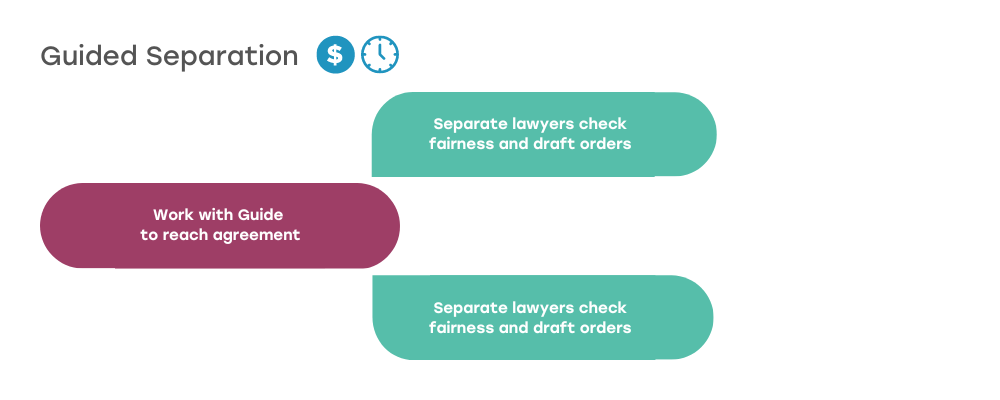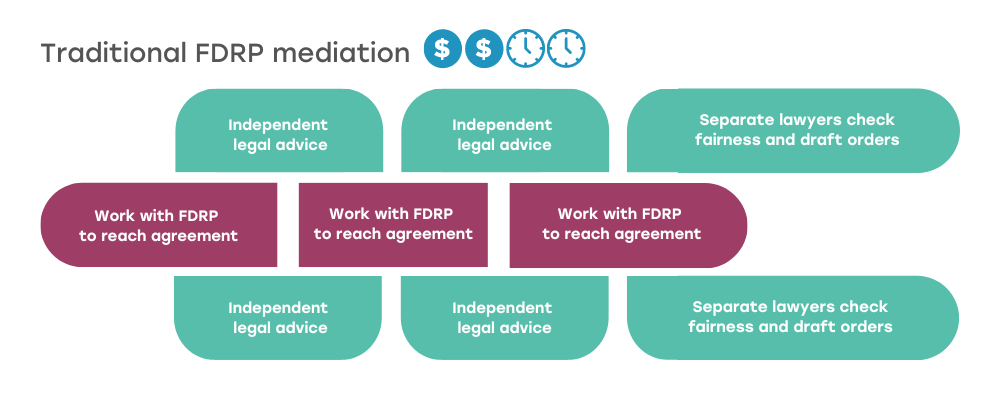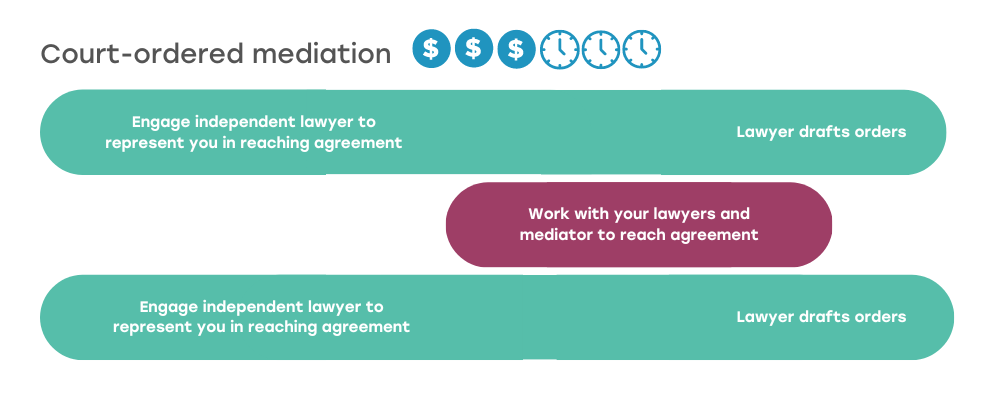For many couples, mediation is a crucial step in reaching an agreement. It’s when an independent person helps you negotiate your financial and property settlement and parenting arrangements.
Fighting out your agreement in Court can be drawn-out, costly and stressful. Mediation is a dispute resolution process designed to keep your matter as amicable as possible and out of Court.
Family mediators in Australia have to be accredited Family Dispute Resolution Practitioners (FDRPs.) They work to facilitate discussions, problem solve and promote understanding to help you reach an outcome that works for both of you.
The agreement you reach through mediation isn’t legally binding. You need separate lawyers to draft what you’ve agreed into consent orders and submit them to the Court, where the agreement is checked to ensure it’s fair for everyone involved.
Mediation can take several forms.
Guided Separation
Guided Separation is a form of evaluative mediation, which means you work with a mediator who is both a qualified FDRP and a practising Barrister or solicitor. We call them Guides.
While the Guided Separation mediator is a qualified lawyer, they are not representing either of you. They are not on your side and not on your partner’s side. They are on the side of fairness. Their legal qualification means they can answer any question about the law, provided it is requested by both of you and done in an impartial way.
The Guided Separation program follows a process of straightforward steps. Your starting point is a questionnaire that you both complete. Your answers are then used by the Guide to create a discussion draft of the agreement for you both to consider. This is used as the basis of your mediation. You also decide on the target date to complete your agreement. You have a path for progress and a clear timeline that suits your needs and goals. Typically, this is the fastest and most amicable way to reach an agreement.

After Guided Separation, independent lawyers are required to convert your agreement into the relevant legally binding instruments like binding financial agreements or applications for parenting or property orders.
Traditional FDRP mediation
In a traditional setting, you work with a non-legally qualified FDRP who facilitates conversations between you and your ex-partner. They can help you work together but can’t answer your questions about how the law operates or what a fair range of outcomes might be in your circumstances. You work with your own lawyers so you understand your rights and entitlements and the long-term effects of your decisions.

This approach can work if you, your partner, your mediator and your lawyers all work towards the same goal and have the same de-escalation mindset and if the advice is sensible and realistic. But there are a lot of moving parts. A pain point of traditional family law is that it can be costly and stressful. The back and forth between lawyers and mediators can create disagreements that didn’t exist before if not all parties have the same approach.
Court-ordered mediation
If you’ve failed to reach an agreement through traditional FDRP mediation or legal representation, your case may escalate to Court. The judge can decide that your failure to agree is due to a relationship issue rather than a legal one. In this case, they can order you to undertake court-ordered mediation. Even if you’ve attempted FDRP mediation in the past, the judge can still mandate mediation again.
You’ll both sit in a room and work with your lawyers and a court-appointed or private mediator until you both compromise and reach an agreement. In this setting, the lawyers usually draft the agreement during the mediation.

This process often occurs at the end of an incredibly stressful and costly period where you’ve both paid thousands for lawyers. Matters have escalated and headed to Court, only to end up with you both back in mediation to reach agreement.
Mediation exemptions
Mediation is not appropriate in some cases where there is a legal reason for a Court appearance. According to the Family Circuit and Family Court of Australia, the following conditions may mean you’re not required to undertake mediation:
- in an application for parenting orders, if there are allegations of child abuse or family violence or a risk of child abuse or family violence
- in an application for financial orders, if there are allegations of family violence or a risk of family violence
- for urgent applications
- if you would be unduly prejudiced if you were to complete mediation
- if one of you has filed a previous family law application in the last 12 months
- if you’re applying for divorce only
- if the proceeding is a child support application or appeal, or
- if the proceeding involves a court’s jurisdiction in bankruptcy under section 35 or 35B of the Bankruptcy Act 1966.
If none of these situations applies to your separation, then mediation is something you’re likely to encounter to help you work towards an agreement.
At The Separation Guide, we advocate for early intervention. We encourage separating couples to seek assistance from a mediator sooner rather than later. This can save both of you money, time and stress, leaving more in your asset pool and allowing you to move on as quickly, calmly and fairly as possible.
Our 3-minute Q&A can give you a pathway for separation, and let you know if Guided Separation will suit your situation.
The Separation Guide aims to make separation and divorce simpler, more manageable and less stressful. To find out more about how one of our Network Members could support your separation, take our free 3-minute Q&A.
Disclaimer
The information in our resources is general only. Consider getting in touch with a professional adviser if you need support with your legal, financial or wellbeing needs.
























